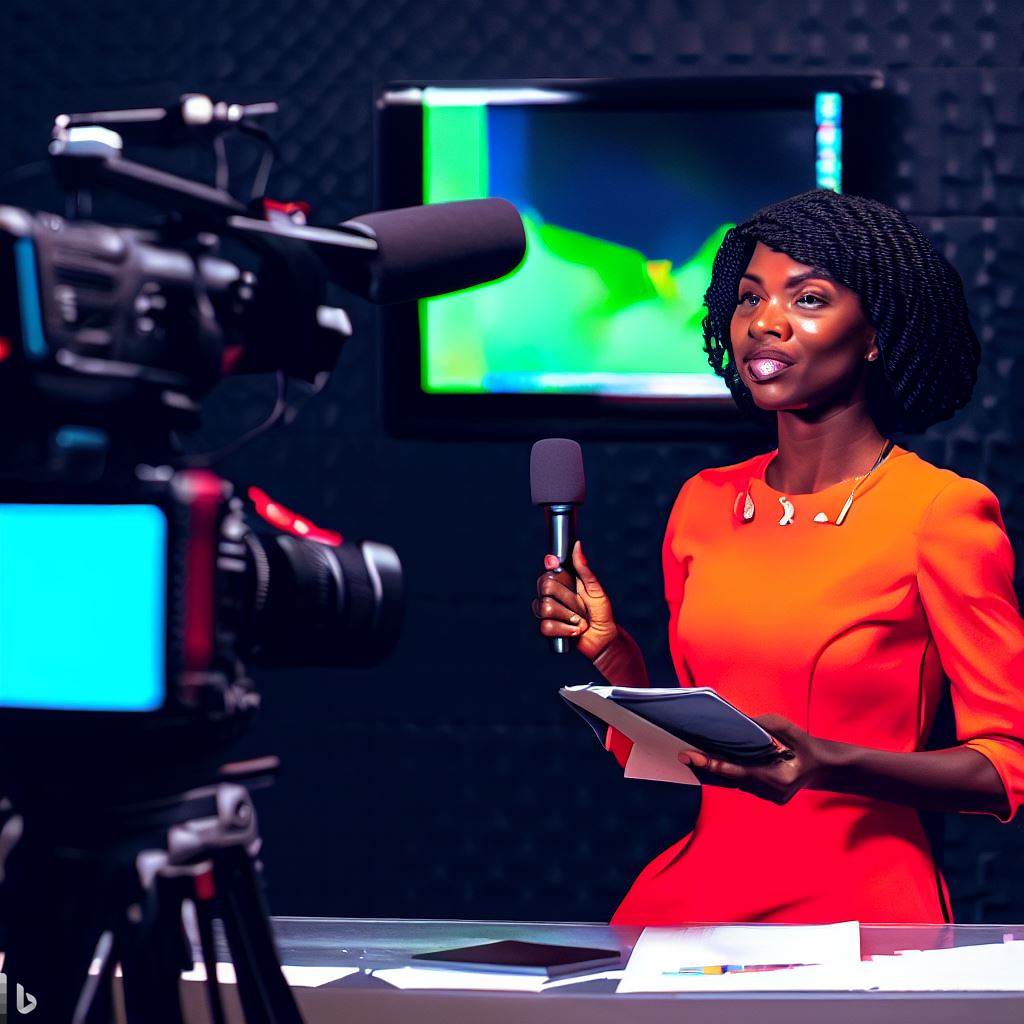Introduction
Background information on the relationship between politics and media in Nigeria
In Nigeria, politics and media have always had a complex and intertwined relationship.
The media, especially television, plays a crucial role in shaping public opinion and influencing political outcomes.
The Nigerian media landscape has evolved alongside the country’s democratic transition, but it continues to face challenges in maintaining its independence and impartiality.
The interplay between politics and TV reporting in Nigeria is a crucial component of the country’s evolving democracy.
Television is the most influential medium in Nigeria, reaching a large portion of the population.
The manner in which TV presents political information significantly affects the country’s political process and citizens’ understanding of the political landscape.
Political interests heavily influence Nigeria’s media landscape, and political actors often use TV to gain support, disseminate propaganda, or manipulate public opinion.
Fair and unbiased reporting is in a delicate balance with the media’s commercial and political interests.
The interplay between politics and TV reporting extends beyond content to media ownership and regulation.
Political elites control major TV stations and use them to shape the narrative in their favor.
The government’s role in regulating and controlling the media restricts the freedom of the press and limits the availability of diverse and critical perspectives.
The relationship between politics and TV reporting in Nigeria is complex and has significant implications for the country’s democracy and media landscape.
It is essential for the media to navigate this interplay while upholding their duty to provide accurate and balanced information to the public.
Political Influence on TV Reporting in Nigeria
A. Government ownership and control of television stations
- Television stations in Nigeria are often owned and controlled by the government.
- This ownership allows the government to shape the narrative and influence TV reporting.
- Government-controlled stations may only report news that aligns with the government’s agenda.
- Journalists working for these stations face pressure to adhere to government directives in reporting.
- The government’s control over TV stations limits the diversity of opinions and perspectives presented.
B. Direct and indirect pressure tactics by political elites
- Political elites in Nigeria exert direct and indirect pressures on TV reporting.
- Direct pressures include threats, blackmail, and physical attacks against journalists.
- Indirect pressures involve influencing media outlet owners to control the reporting narrative.
- Advertisement withdrawals, denial of access to information, and harassment are common tactics used.
- Political elites aim to manipulate the media to only present information that favors their interests.
C. Examples of political interference in TV reporting
- During the 2019 general elections, politicians used media outlets to spread false information.
- Some TV stations aired biased programs supporting specific candidates and parties.
- Journalists who attempted to report objectively were often targeted for harassment and intimidation.
- Cases of journalists being arrested or detained for reporting on corruption and government inefficiency have been documented.
- The political interference in TV reporting undermines the credibility of the media and threatens press freedom.
In short, political influence on TV reporting in Nigeria is significant and detrimental to the integrity of journalism.
Government ownership and control of television stations allow the government to shape the narrative and limit diverse opinions.
Direct and indirect pressure tactics by political elites further restrict objective reporting.
Numerous examples of political interference in TV reporting, such as spreading false information and targeting journalists, highlight the challenges faced by the media.
To ensure a truly independent and unbiased media, it is crucial to address these issues and protect press freedom.
Media Bias and Objectivity
A. Impact of political affiliations on TV reporting
- Political affiliations heavily influence the way TV reporters present information to viewers.
- Reporters often prioritize their own political biases, resulting in biased reporting.
- TV networks are sometimes owned by politicians, leading to a strong bias in reporting.
- Political interference in TV reporting compromises the objectivity of news coverage.
- News stories are often slanted or filtered to protect the interests of politicians or their parties.
B. Case studies illustrating media bias in Nigeria
- During the 2019 Presidential election, certain TV networks favored a particular candidate.
- Biased reporting negatively impacted the perception and trust in the news industry.
- Coverage of political rallies by different TV stations revealed clear biases towards different parties.
- TV reporters often selectively covered certain events, omitting crucial information.
- Media bias during the election contributed to the spread of false information among the public.
C. Ethical implications of biased reporting
- Biased reporting violates the ethical principle of objectivity in journalism.
- Viewers are denied access to unbiased and factual information, hindering their ability to make informed decisions.
- Biased reporting perpetuates division and polarization among the public.
- Journalistic integrity is compromised when reporters prioritize personal or political biases.
- Media bias undermines democracy by shaping public opinion in favor of a particular political agenda.
In fact, the interplay of politics and TV reporting in Nigeria has contributed to widespread media bias.
Political affiliations heavily influence the way information is presented, compromising objectivity.
Case studies have highlighted instances of bias during elections and in daily news coverage.
Biased reporting violates ethical principles and has negative consequences for viewers and democracy.
It is essential for the media industry in Nigeria to address this issue and strive for unbiased and objective reporting.
Read: Nigeria’s Most Influential Television News Stories
Implications for Democracy
A. Limited access to diverse viewpoints
Ideally, a democratic society requires citizens to be well-informed and exposed to a range of perspectives.
TV reporting in Nigeria, however, often fails to provide such diversity in viewpoints.
This limited access to differing opinions undermines the democratic principles of openness and inclusivity.
B. Effect on public opinion and voter education
TV reporting in Nigeria plays a significant role in shaping public opinion and influencing voter decisions.
With biased reporting and lack of diverse viewpoints, citizens are deprived of balanced information.
This leads to uninformed voters and a skewed understanding of political issues, hindering the democratic process.
C. Challenges to transparency and accountability
The interplay of politics and TV reporting in Nigeria also poses challenges to transparency and accountability.
Corrupt politicians often manipulate news coverage to protect their interests and hide their wrongdoings.
This lack of transparency erodes trust in the democratic system and undermines the ability to hold leaders accountable.
In general, the interplay of politics and TV reporting in Nigeria has several implications for democracy.
These include limited access to diverse viewpoints, an effect on public opinion and voter education, and challenges to transparency and accountability.
To strengthen democracy in Nigeria, it is crucial to address these issues and promote unbiased, inclusive reporting.
Read: Balancing Objectivity in Nigeria’s Television Reporting

Journalists’ Role in Challenging Political Influence
A. Importance of media independence and freedom of the press
- Media independence and freedom of the press are crucial for a functioning democracy.
- Journalists play a key role in upholding these principles and ensuring the government remains accountable.
- Without a free press, political influence and corruption can go unnoticed and unchecked.
- Media freedom allows journalists to investigate and report on matters of public interest without fear.
- It enables them to challenge political narratives and present objective information to the public.
B. Efforts by journalists to resist political interference
- Journalists often face pressure and intimidation from the government and politicians.
- Politicians may attempt to control media narratives and silence dissenting voices.
- Despite these challenges, brave journalists in Nigeria continue to resist political interference.
- They refuse to be silenced and work tirelessly to bring forth the truth.
- Some journalists form alliances and organizations to protect their independence and push back against political influence.
C. Promoting investigative journalism to uncover the truth
- Investigative journalism plays a crucial role in challenging political influence.
- By delving deep into stories, journalists can uncover hidden truths and expose political wrongdoing.
- Investigative reports serve as a powerful tool to hold politicians accountable for their actions.
- Brave journalists risk their safety to dig deeper and expose corruption and malpractices.
- These reports shake the political establishment and shed light on issues that would have otherwise remained hidden.
In essence, journalists play a vital role in challenging political influence in Nigeria.
Media independence and freedom of the press are essential for a functioning democracy.
Efforts by journalists to resist political interference are crucial to ensure accountability.
Promoting investigative journalism is necessary to uncover the truth and expose political wrongdoing.
By continuing their brave work, Nigerian journalists contribute to a more transparent and democratic society.
Read: The Future of Television Reporting in Nigeria
Public Perception and Media Literacy
The interplay of politics and TV reporting in Nigeria has significantly shaped how the public perceives news coverage.
The intertwining of politics and TV reporting in Nigeria has significantly molded how the public perceives news.
This has eroded trust in TV reporting, necessitating media literacy education to help people cultivate bias recognition and critical thinking.
In Nigeria, trust in TV reporting has waned due to political influence on news coverage. The nexus between politicians and media outlets has resulted in skewed reporting, tinted by political inclinations.
Media literacy is essential in this context. Viewers must gain the ability to critically dissect news. By understanding biases and hidden motives, they can make sound judgments about the information presented.
Media literacy involves familiarizing viewers with biases such as partisan and commercial leanings. This awareness enables the identification of politically motivated narratives or sensationalism.
Critical thinking is critical to media literacy. Encouraging viewers to question presented information promotes astute news consumption—fact-checking, consulting multiple sources, and analyzing diverse perspectives.
Additionally, media literacy should emphasize media transparency and accountability, clarifying the importance of ethical journalism. This equips viewers to demand accuracy and impartiality.
Media literacy must go beyond traditional sources to combat misinformation.
Ultimately, media literacy empowers viewers, restoring trust through discernment.
The interplay of politics and TV reporting in Nigeria mandates media literacy for bias comprehension and critical acumen, thus raising news consumption standards.
Read: Steps to Landing Your First TV Editing Job in Nigeria
Regulatory Measures and Policy Reform
A. Role of regulatory bodies in ensuring media independence
- Regulatory bodies play a crucial role in safeguarding the independence of the media.
- They establish guidelines and standards to ensure fair and unbiased TV reporting.
- These bodies protect journalists from political interference or pressure.
- By enforcing codes of conduct, regulatory bodies foster professionalism and ethical reporting.
- They grant licenses and monitor the operations of TV stations to maintain media independence.
- Regulatory bodies act as a watchdog to prevent the abuse of power by TV networks.
B. Implementing transparency and accountability mechanisms
- Transparency is essential to uphold the integrity of TV reporting in Nigeria.
- Media organizations should disclose their funding sources and political affiliations.
- Employing transparent editorial policies helps build trust with the audience.
- Regulatory bodies can ensure transparency by conducting regular audits and investigations.
- Journalists should report conflicts of interest and maintain accountability to their audience.
- Establishing clear procedures for addressing complaints and grievances promotes accountability.
C. Proposed policy reforms to foster unbiased TV reporting
- Introduce a statutory code of ethics for TV journalists to adhere to.
- Ensure that regulatory bodies are independent of government influence.
- Strengthen the whistleblower protection for journalists reporting on political matters.
- Establish a media ombudsman to address complaints and mediate disputes impartially.
- Encourage diversification of ownership in the TV broadcasting industry to prevent undue influence.
- Enhance investment in media literacy programs to empower the audience to discern biased reporting.
In the end, regulatory measures and policy reforms are vital in maintaining the interplay between politics and TV reporting in Nigeria.
Regulatory bodies must prioritize media independence, implement transparency, and accountability mechanisms, and propose policy reforms to foster unbiased TV reporting.
By doing so, Nigeria can create an environment where the media acts as a true watchdog, holding politicians accountable while serving the public interest.
Conclusion
A. Recap of the interplay between politics and TV reporting in Nigeria
In Nigeria, the relationship between politics and TV reporting is complex and often influenced by political interests.
TV stations are frequently subjected to political interference and manipulation, impacting the objectivity and accuracy of news reporting.
Journalists face challenges such as threats, intimidation, and censorship, which hinder their ability to provide unbiased information to the public.
B. Emphasize the importance of a free and independent media for democracy
A free and independent media is essential for a functioning democracy.
It serves as a watchdog, holding politicians accountable and ensuring transparency in the political process.
A media that is not controlled or manipulated by political powers is crucial for an informed citizenry and the protection of human rights.
C. Closing thoughts and calls to action
It is imperative for the Nigerian government to safeguard press freedom and protect the rights of journalists.
Efforts must be made to prioritize the independence of TV reporting, allowing journalists to operate without fear of political reprisal.
Civil society organizations and international bodies should advocate for the protection of media rights and support initiatives promoting media professionalism.
Ultimately, a free and independent media in Nigeria will enhance democracy, promote accountability, and contribute to a more informed society.




